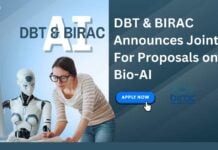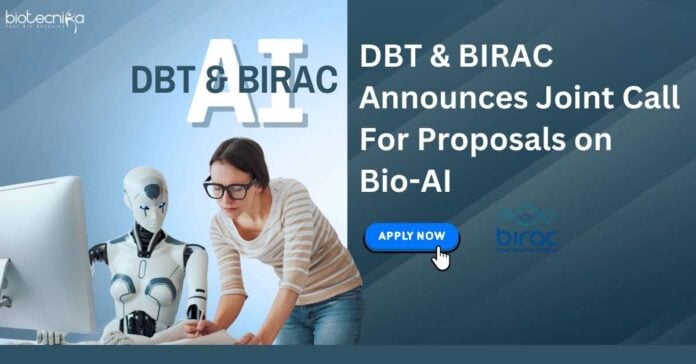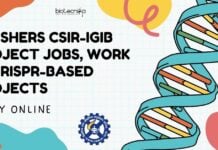DBT & BIRAC Announces Joint Call For Proposals Bio-AI – Applications Invited Online
DBT & BIRAC Announces Joint Call For Proposals Bio-AI – Applications Invited Online. Interested and eligible applicants can check out all of the details on the same below:
DBT BIRAC Joint Call for Proposals on Bio-AI for establishing मूलांकुर hubs under BioE3 Policy for Biomanufacturing
Submit Problem Statements and Research solutions as Concept Note (LoIs)
1. BACKGROUND
Department of Biotechnology (DBT) with the approval of the Cabinet has announced the BioE3 (Biotechnology for Economy, Environment and Employment) policy for “Fostering High-performance Biomanufacturing”. This initiative is supported under the Cabinet Approved ‘Biotechnology Research Innovation and Entrepreneurship Development (Bio-RIDE)’ scheme to foster innovation, promote bio-entrepreneurship, and strengthen India’s position as a global leader in Biomanufacturing and Biotechnology.
Bio-AI is one of the enablers for building data-driven, cutting-edge, programmatic research support for the Biomanufacturing initiative. The outcomes are expected to provide critical and novel research leads impacting Health, Agriculture and Environment.
2. SCOPE OF THE CALL
The Bio-AI call invites problem statements and research solutions in Biomolecular Design, Sustainable Agriculture, Synthetic Biology, Ayurveda and Genomics Diagnostics to be addressed by multi-disciplinary teams with research expertise across synthetic biology, AI/ML, computation. LoIs should be submitted now and for shortlisted applications, full-length proposal would be sought.
i) Biomolecular Design
-
Engineering novel proteins, enzymes, and RNA-based molecules for advanced biomedical and biotechnological applications.
-
Designing next-generation protein, and RNA-based antibodies for targeted therapeutics and immune modulation.
-
Developing advanced enzyme inhibitors, RNA aptamers, and de novo enzyme designs for precision disease intervention and metabolic engineering.
-
Constructing bio-nanomachines and catalytic biomolecules with programmable molecular functions for diagnostics, therapeutics, and synthetic biology applications.
ii) Sustainable Agriculture
-
Engineering drought-resistant cereal crops for enhanced climate resilience
-
Developing AI-powered, non-invasive sensing technologies (e.g., drone imaging, infrared spectroscopy) for early disease detection
-
Predictive modeling of milk production and health parameters in dairy cattle using AI and genomics
iii) Synthetic Biology
-
AI optimized metabolic pathways for biofuel and biomaterial production.
-
Predicting enzyme functions for more efficient bioprocessing.
-
Improve strain engineering for microbial factories.
-
Synthetic/engineered organisms as environmental biosensors
iv) Ayurveda
-
AI-driven Ayurvedic Pharmacogenomics: Developing predictive models to personalize Ayurvedic treatments based on genetic, metabolic, and microbiome profile
- AI-enabled Herb-Drug Interaction Analysis: Identifying potential interactions between Ayurvedic formulations and modern pharmaceuticals using AI and molecular modelling.
- Standardization & Authentication of Ayurvedic Formulations: Leveraging AI and analytical chemistry to validate and authenticate medicinal plant extracts.
- AI-assisted Plant-Based Drug Discovery: Mining Ayurvedic texts and databases to identify bioactive compounds with therapeutic potential.
- Gut Microbiome Modulation through Ayurveda: Understanding how Ayurvedic diets and herbs influence gut microbiota for managing metabolic and autoimmune disorders.
v) Genome Diagnostics
-
AI-powered risk prediction models for diabetes, cardiovascular diseases, and metabolic disorders
-
Biomarkers for early cancer detection, disease progression tracking, and treatment response prediction.
-
Single-cell and spatial genomics: Utilizing AI to analyze single-cell RNA sequencing and spatial transcriptomics for tumor microenvironment profiling and rare disease diagnosis.
-
Genetic risk stratification for neurodegenerative disorders: Identifying genomic and RNA-based signatures associated with conditions like Alzheimer’s and Parkinson’s to enable early diagnosis and intervention.
3. GRANT GUIDELINES
-
The problem statements should be addressed by data-driven, cutting-edge, multidisciplinary, programmatic research initiatives for projected outcomes and are not for establishing infrastructure/facilities/applications of AI for screening, disseminating resources/healthcare/education etc. Proposals lacking significant biotech research questions and solutions and dwelling largely on computational programs or AI/ML methods will not be considered for support.
-
Duration: The problem statements should be addressed in a two-year period. A maximum of Rs 25 crore grant will be considered based on merit and actual requirements of the proposal.
-
This grant is not for investigator-driven independent research efforts and will only consider applications that are from inter-disciplinary science teams led by a coordinator with the team having demonstrated expertise and significant research leads to achieve the desired outcomes.
-
The programmatic research support is for AI-guided closed loop platforms, in which predictions, experiments and analyses are integrated into the system. Therefore, the research methodology should clearly articulate how the proposed AI based solutions/decisions are analyzed and validated in experimental settings.
-
Inter-institutional and inter-disciplinary teams are encouraged to come together for setting up of hubs in a hub and spoke model.
-
It is expected that successful applicants have the strengths, resources and computational infrastructure to host the AI powered tools and drive the big data analytics (computational programmes). Additional AI infrastructure mechanism may be supported through other mechanisms and will not be funded through grants in this program. Research teams are expected to focus on advancing capabilities for development of developing indigenous Large Language Models (LLMs) utilizing neural network data and ‘omics’ data and foundational models.
-
IP emanating from the program will be governed by the DBT IP Guidelines 2023 https://dbtindia.gov.in/regulations-guidelines/guidelines/dbt-ip-guidelines-2023.
4. ELIGIBILITY
-
Researchers/Scientists working in the Government Organizations/ Universities /Academic Institutions / National Laboratories / DSIR recognized Non-Profit Organizations/start-ups/industries with sound scientific & technical backgrounds and relevant publications in the proposed areas can submit the research proposals addressing various problem statements. Partnership of academia with industry and start-ups is encouraged.
-
Academic Organisations
a. Proposals may be submitted by interested applicants engaged in research activities at various Institutions/Universities/Societies/Trusts/NGOs/ Foundations/Voluntary Organizations, recognized as a Scientific and Industrial Research Organization (SIRO).
b. The Principal investigator must have at least four years of the employment remaining in the institution at the time of proposal submission. -
Industry
a. Eligibility criteria for the industries will be as per “Implementation Plan for the Biomanufacturing and Biofoundry Initiative” attached at ANNEXURE I.
b. Pre-requisite documents required to be submitted by the industry as per the BIRAC norms are as follows: -
Companies/Startups
a. Incorporation certificate
b. CA/CS certified shareholding pattern as per BIRAC format (Companies having a minimum of 51% Indian shareholding /individuals holding Indian passports are only eligible) mentioning UDIN number.
c. Details regarding in-house R&D facility, if any; or Incubation Agreement with recognized Incubator.
d. Audited financial details of latest last three financial years.
e. Copy of passports of the shareholders if required (in support of 51% eligibility criteria). -
Limited Liability Partnership
a. Incorporation /Registration Certificate
b. Partnership deed; CA/CS certified certificate which states that minimum half of the partners are Indian citizens mentioning UDIN number.
c. Copy of passports of Indian partners/subscribers
d. Research mandate/ details regarding in-house R&D facility, if any incubation agreement.
e. Audited financial details of the last three financial years.
Companies/LLP if recommended have to provide a declaration stating that Companies/LLP is not in default of BIRAC OR any other organization. Further there are no Legal Proceedings going against the applicant.
5. MODE OF SUBMISSION
Proposals may be submitted by both Academia and Industry applicants, either independently or as a collaborative project.
a. For proposals from Academia/Research Institutions/National Laboratories: Interested applicants should submit the proposals in the prescribed format duly forwarded by the executive head of the institution through the Department’s e-ProMIS portal (www.dbtepromis.nic.in).
b. For proposals from Industry and Industry-Academia/ DSIR recognized Non-Profit Organizations/Startups collaboration: Interested applicants should submit the proposals in the requisite format duly forwarded by the executive head of the Company/LLP/Institution by logging to the BIRAC website (www.birac.nic.in).
6. EVALUATION CRITERIA
The proposals will be evaluated as per existing norms of DBT and BIRAC.
7. FUNDING MODALITIES
a. Projects having academic partners only will be funded by DBT. Projects involving Academia and Industry or only industry will be supported by BIRAC.
b. Extent of funding will depend on the proposed activities and will be in alignment with the “Implementation Plan for the Biomanufacturing and Biofoundry Initiative” attached at ANNEXURE-1.
c. Project duration will be upto 2 years.
8. KEY METRICS FOR ASSESSMENT
Key considerations for reviewing the proposals for support would include:
8.1 Scientific merit of proposal
• Alignment to call objectives and potential to deliver novel research leads impacting Human health, Crop production and Environment.
• Justification for utilizing AI/ML driven synthetic biology/metabolic engineering approached over conventional methods.
8.2 Approach and methodology
• Relevance of the choice of AI/ML and biotech methods to the proposed solution
• Realistically planned activities in regard to time and budget
• Integration of multiple research partners across institutions/disciplines including startups for delivering outcomes
8.3 Organization and investigator capabilities
• Research expertise and experience
• Existing facilities/infrastructure
8.4 Impact and deliverables
• At the end of second-year, specific success stories and resourceful project leads
• Potential to attract partnerships/investments within two years and demonstrate economic impact.
9. PROPOSAL FORMAT AND SUBMISSION
Proposals may be submitted by both Academia and Industry applicants, either independently or as a collaborative project.
- For proposals from Academia/Research Institutions: The application must be submitted as per the prescribed format duly forwarded by the Head of the institution through the Department’s e-ProMIS portal (www.dbtepromis.nic.in).
- For proposals from Industry and Industry-Academia collaboration: The application must be submitted as per the prescribed format duly forwarded by the Head of the Company/Institution by logging to the BIRAC website (www.birac.nic.in).
10. CONTACT INFORMATION
For queries regarding the grant, contact:
Dr. Kalaivani Ganesan, Scientist F, DBT @ [email protected]; [email protected]
Dr. Amit Katiyar, Chief Manager IP & TM, BIRAC @ [email protected]
For Technical queries in online submission, please write to: DBT Application support – e-promise team, Tel: 011-24365136, [email protected]
Last date for submission of proposals is 10th May, 2025.
Editor’s Note: Please ensure you are subscribed to the Biotecnika Times Newsletter and our YouTube channel to be notified of the latest industry news. Follow us on social media like Twitter, Telegram, Facebo





































